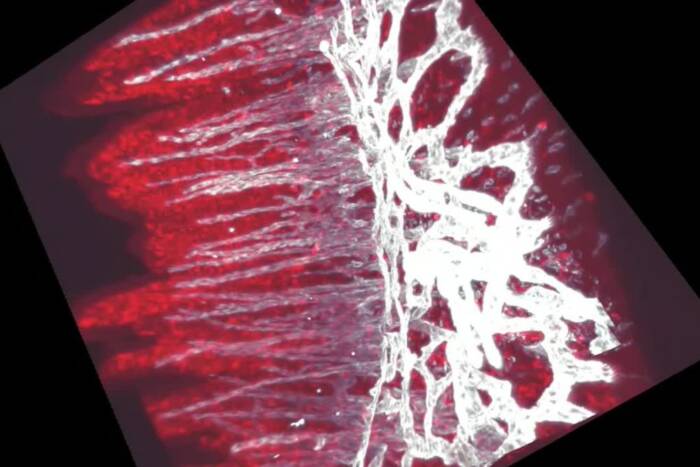2011 Pearl Meister Greengard Prize to be awarded to McGill University memory researcher
Brenda Milner, a pioneer in the field of cognitive neuroscience whose discoveries revolutionized the understanding of memory, will be awarded the 2011 Pearl Meister Greengard Prize from The Rockefeller University. The prize, which carries an honorarium of $100,000, will be presented November 3 at Rockefeller University’s Caspary Auditorium.
The Pearl Meister Greengard Prize was established by Paul Greengard, Vincent Astor Professor at Rockefeller University and head of the Laboratory of Molecular and Cellular Neuroscience, and his wife, sculptor Ursula von Rydingsvard. Greengard donated the proceeds of his 2000 Nobel Prize in Physiology or Medicine to Rockefeller

photo: Owen Egan
University and, in partnership with generous supporters of the university, created the annual award named in memory of Greengard’s mother, who died giving birth to him. Since 2004, the Pearl Meister Greengard Prize has recognized female scientists who have made exceptional contributions to biomedical science, a group that historically has not received appropriate recognition and acclaim.
“Brenda Milner is a great neuroscientist, and the founder of the field of neuropsychology,” says Greengard. “By virtue of her stature as a preeminent scientist, she has greatly advanced efforts to achieve acceptance and respect for women in science.”
Milner is the Dorothy J. Killam Professor at McGill University’s Montreal Neurological Institute and professor in the department of neurology and neurosurgery at McGill University. She has spent her career unraveling the mysteries of the brain, and she has been credited by Nobel Prize winner Eric Kandel with merging the fields of psychology and neurobiology to create the field of cognitive neuroscience.
“I am absolutely delighted and amazed to receive this special award and so proud and honored to be representing women scientists in this context,” says Milner. “I am very privileged for having been able to pursue my sense of curiosity within the culture of excellence at the Montreal Neurological Institute, as well as to train and encourage talented young students — driving forces throughout my career to which I attribute much of my success.
Milner’s seminal research has provided many landmark discoveries in the study of human memory and the brain’s temporal lobes, which play a key role in emotional responses, hearing, memory and speech.
She was chosen as the 2011 recipient of the Pearl Meister Greengard Prize by the selection committee of ten jurors, of which five are Nobel Laureates. The members of the selection committee are: Marc Tessier-Lavigne, president of Rockefeller University; Torsten N. Wiesel, chair and Nobel Laureate; Richard Axel, Nobel Laureate; Cori Bargmann; Gunter Blobel, Nobel Laureate; Titia de Lange; Joseph L. Goldstein, Nobel Laureate; Philippa Marrack, 2005 recipient of the Pearl Meister Greengard Prize; Paul Nurse, Nobel Laureate; and David D. Sabatini.
Milner began her career studying experimental psychology at the University of Cambridge, where she received a bachelor’s degree in 1939. She then began studies for a master’s degree at Cambridge, but soon joined a team interested in distinguishing fighter pilots from bomber pilots in aptitude tests at the beginning of the Second World War. She moved to Canada in 1944 to take an academic position at the Institute of Psychology at the University of Montreal. She changed her focus to memory in the 1950s, during the course of her doctoral research at McGill, where she administered perceptual tests to epileptic patients before and after surgery on their temporal lobes.
She later became known for her work with an epileptic patient known as H.M., who had become unable to form new memories after having parts of both temporal lobes removed.
Milner’s research has shed light on how different areas of the brain are involved in memory formation, as well as on how the right and left hemispheres of the brain complement each other. When Milner began her research career, the brain’s right hemisphere was viewed as relatively unimportant. Her methodical testing of patients revealed unique functions of the brain’s right hemisphere. Her research today continues to focus on the interaction between the brain’s hemispheres, and she has begun to use functional imaging in human subjects to explore this interaction.
Milner is a foreign associate of the National Academy of Sciences and a fellow of the American Academy of Arts and Sciences. She has been awarded honorary degrees from more than 20 different universities around the world. In 2010 she was named one of 25 Transformational Canadians. Milner is the recipient of numerous scientific awards including the International Balzan Prize for Cognitive Neurosciences, the Gairdner Foundation International Award and the Prix Wilder-Penfield (Prix du Québec). She is a fellow of the Royal Society (London) and the Royal Society of Canada and was appointed to Companion of the Order of Canada in 2004. In 2007, she created the Brenda Milner Foundation to support and foster young researchers in the field of cognitive neuroscience through postdoctoral fellowships at the MNI.


